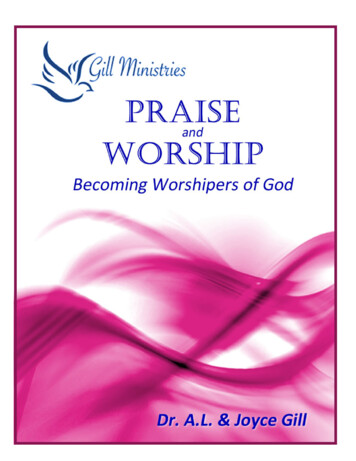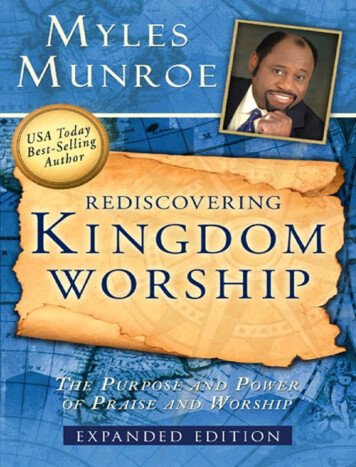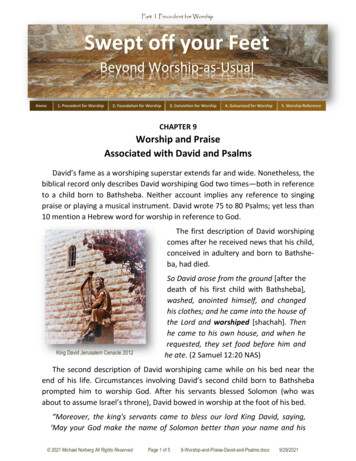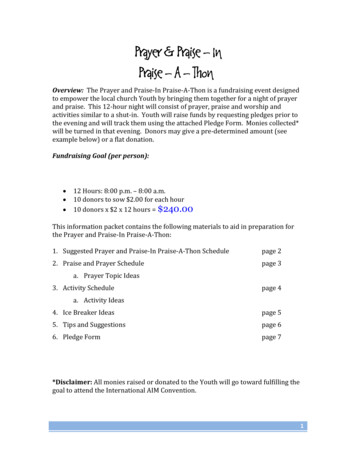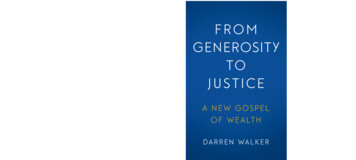
Transcription
“This will become a defining manifesto of our era.”—Walter IsaacsonEbook and audio editions of this book are available rdFoundation“A recalibration and reimagination of the philanthropic model craftedby the Carnegie and Rockefeller families over a century ago. This newgospel must be heard all over the world!”—David Rockefeller, Jr.“Orchestrating a dynamic chorus of vital voices and vibrant vision,Walker harnesses singular storytelling to catalyze ideas andinstigate inspiration for a more just future.”—Ava DuVernay“A clarion call for a new kind of philanthropy to transform our society.”—Joel Fleishman“Walker illustrates how philanthropy is about more than giving money away;it’s about giving energy, and providing ‘righteous optimism’for the sake of justice.”—Agnes Gund“From Generosity to Justice is a rare, eye-opening, andexciting read that opens both the heart and mind.”—Shonda Rhimes“His bold call for business leaders to demonstrate moral courage is just onepart of a new model for justice-minded philanthropy, one that offers both theadvantaged and disadvantaged tangible ways to disrupt inequality.”—Indra Nooyi“From Generosity to Justice shows why Darren Walker is one of philanthropy’smost forward-thinking and important leaders.”—Michael BloombergDA R R EN WA L K ERDarren Walker is president of the FordFoundation, a 13 billion international social justicephilanthropy. He is co-founder and chair of the U.S.Impact Investing Alliance and the Presidents’ Councilon Disability Inclusion in Philanthropy.Before joining Ford, Darren was vice president at theRockefeller Foundation, overseeing global and domesticprograms. In the 1990s, he was COO of the AbyssinianDevelopment Corporation, Harlem’s largest communitydevelopment organization.Darren co-chairs New York City’s Mayoral AdvisoryCommission on City Art, Monuments, and Markers,and serves on The Independent Commission on NewYork City Criminal Justice and Incarceration Reformand the UN International Labour Organization GlobalCommission on the Future of Work. He serves on manyboards, including Carnegie Hall, the High Line, andthe Committee to Protect Journalists. He is a member of the Council on Foreign Relations, the AmericanAcademy of Arts and Sciences, and the recipient of 16honorary degrees and university awards, including Harvard University’s W.E.B. Du Bois Medal.Educated exclusively in public schools, Darren was amember of the first Head Start class in 1965 and graduated from The University of Texas at Austin. He hasbeen included on TIME ’s annual 100 Most InfluentialPeople in the World, Rolling Stone’s 25 People Shapingthe Future, Fast Company’s Most Creative People inBusiness, and OUT Magazine’s Power 50.“Walker bravely tackles the subject of inequality with one pressingquestion in mind: What can philanthropy do about it?”—Ken ChenaultF R O M G E N E R O S I T Y TO J U S T I C EPr a i s e fo rFr o m G en er o s i t y to J u s t i c eFRO MGENEROSIT YTOJUSTICEA N E W G O S PELO F W E A LT HDA R R EN WA LK ERAndrew Carnegie wrote “The Gospel ofWealth” in 1889, during the height of theGilded Age, when 4,000 American familiescontrolled almost as much wealth as the rest ofthe country combined. His essay laid the foundation for modern philanthropy.Today, we find ourselves in a new GildedAge—defined by levels of inequality that surpass those of Carnegie’s time. The wideningchasm between the advantaged and the disadvantaged demands our immediate attention.Now is the time for a new Gospel of Wealth.In From Generosity to Justice: A New Gospel of Wealth, Darren Walker, president of theFord Foundation, articulates a bold vision forphilanthropy in the twenty-first century. Withcontributions from an array of thinkers, activists, and leaders including Ai-jen Poo, LaurenePowell Jobs, Kenneth Frazier, Carly Hare, andElizabeth Alexander, Walker challenges andemboldens readers to consider philanthropy asa tool for achieving economic, social, and political justice.That task requires humility, moral courage,and an unwavering commitment to democraticvalues and institutions. It demands that allmembers of society recognize their own privilege and position, address the root causes ofsocial ills, and seek out and listen to those wholive amid and experience injustice.What began in Carnegie’s day as a manualfor generosity is now reimagined as a guide thatmoves us closer to justice—a guide that helpseach of us find a way to contribute.Justice is calling. It’s time we answer.
FROMGENEROSIT YTOJUSTICE
FROMGENEROSIT YTOJUSTICEA N E W G O S PELO F W E A LT HDA R R EN WA LK ER
Published by The Ford Foundation / Disruption BooksNew York, yright 2019 by The Ford FoundationAll rights reserved.FORD FOUNDATION and colophon are registered trademarks ofthe Ford Foundation.No part of this book may be reproduced, stored in a retrieval system, or transmittedby any means, electronic, mechanical, photocopying, recording, or otherwise, withoutexpress written permission from the copyright holder. Requests for permission should bedirected to info@disruptionbooks.com.“Motto” from THE COLLECTED POEMS OF LANGSTON HUGHES byLangston Hughes, edited by Arnold Rampersad with David Roessel, Associate Editor,copyright 1994 by the Estate of Langston Hughes. Used by permission of Alfred A.Knopf, an imprint of the Knopf Doubleday Publishing Group, a division of PenguinRandom House LLC. All rights reserved.For ordering information or special discounts for bulk purchases, please contactDisruption Books at info@disruptionbooks.com.Cover and text design by Sheila ParrFirst Edition
For David, who taught me the meaningof generosity, justice, and love.
Co n t en t sIntroduction:A New Gospel of Wealth11. From Generosity to Justice:A Continuum of Philanthropy132. The Privilege of Perspective:Seeing and Sharing Access and Opportunity23New Paradigms for Legacy Institutions:A Conversation with Elizabeth Alexander333. The Awareness of Ignorance:Learning What We Don’t Know49Joyful Justice:A Conversation with Laurene Powell Jobs614. The Ownership of Selflessness:Giving with Humility695. The Raising of Roots:Addressing Causes, Not Consequences81
viiiContentsNurturing Communities:A Conversation with Carly Hare956. The Power of Proximity:Valuing Both Expertise and Experience107Bringing Hidden Labor to Light:A Conversation with Ai-jen Poo1177. The Courage of Conviction:Standing Up and Speaking Out127A CEO Speaks for Justice:A Conversation with Ken Frazier1378. The Democracy of Justice:Our Liberation Is Bound Together149Conclusion:The Tenets of a New Gospel159Contributors171Acknowledgments187Notes193
FROMGENEROSIT YTOJUSTICE
Introduc tionA New Gospel of WealthNever before has the world experienced so much inequality.Thanks to major advances in technology, new entrepreneursfundamentally transform the way people live and work. But thesetitans of industry also accumulate wealth on an astounding scale,while the vast majority remain in poverty.1And it’s not just economic inequality run rampant: Aroundthe world, there are grand disparities in how people are treated inculture and in politics, who can access education and economicopportunity, and which groups are free to express themselves andparticipate in a democracy. Even in the most progressive, democratic countries, institutions and systems continue to marginalizeand exclude low-income people, women, the disabled, ethnic andreligious minorities, Indigenous peoples, people of color, and others.I am not describing our current moment, though it maysound like it.Rather, this was the state of the world in 1889, when theAmerican industrialist Andrew Carnegie published the first essay
2From Generosit y to Justiceof what we would later refer to as “The Gospel of Wealth.” Aptlyknown as the Gilded Age, this was a time when industrialisttycoons enjoyed lives of unprecedented, unimaginable opulence,while ordinary people endured low wages, dangerous workingconditions, and overcrowded, unhealthy living quarters.Back then, the United States’ 4,000 richest families possessednearly as much wealth as the other 11.6 million American families combined.2 That level of stark inequality is similar to our ownmost sobering figures. Today, just the top three richest Americans—not even close to the top 4,000—own about as muchwealth collectively as all of the bottom half of the United Statescombined.3 Globally, 130 years after Carnegie’s gospel, Oxfamreports that the 26 richest individuals control as much wealth asthe poorest 3.8 billion—half of the current world population.4There’s a reason many have called ours the “New GildedAge.”5 Indeed, today the problem of inequality is even greater.Economic inequality is one major form of this current crisis—and the form we hear most about—but once again it is notthe only one. We also see rampant, pervasive inequality in politics and government; in culture and creative expression; in education and upward mobility; and—especially—in the prejudicialway that our institutions and systems treat women, people withdisabilities, the LGBTQ community, Indigenous communities,people of color, and poor people. These different inequalities bothcause one another and are the effects of one another. They aredeeply interdependent and intertwined.These inequalities are not abstract, either. They are experiencedevery day, by nearly every one of us. A distorted form of capitalism has produced extreme wealth for owners and daily insecurity for workers. Authoritarian leaders have suppressed rights and
Introduc tion3fomented division, discord, and dysfunction. Fast-moving technological innovations, full of rich potential, are instead used by bothgroups—the owners and the rulers—to suppress and supplant.These inequalities reflect the fact that some people have afuller experience of basic human rights than others do. As a result,these “others” have less access to democracy, social and economicmobility, and their own human dignity.As the president of a social justice foundation with a missionto strengthen democracy, I have one presiding preoccupation: thestaggering threat of inequality. Every day, my colleagues and I ask:What can we do to reduce inequality in all of its forms?Carnegie’s answer to the imbalance of wealth in his times—or perhaps more specifically, the displays of extravagance andindulgence that resulted, and the potential upheaval he feared—was something radical. He wrote that wealthy individuals had aspecial obligation, while they were still alive, to give “benefactionsfrom which the masses of their fellows will derive lasting advantage, and thus dignify their own lives.”6In a word: philanthropy.Carnegie’s ideas fundamentally altered the way the worldthought about wealth and giving, and his philosophy has servedas the underpinning of American philanthropy and, by extension,of giving around the world.Since then, much of the work of philanthropy has beenundeniably beneficial: Millions of people worldwide have beenlifted out of poverty, protected from terrible diseases, providedwith social and economic opportunity, and given access to newtools and resources with which to improve their lives.During the twentieth century, an entire field of institutionalphilanthropy emerged and flourished in the pattern of Carnegie’s
4From Generosit y to Justicemold. Iconic American families—from Rockefeller and Rosenwald to Mellon and MacArthur—endowed and expanded foundations that built schools and libraries, developed new vaccines,revolutionized agriculture, and advanced human freedom. Since1990, the number of people living in extreme poverty has gonedown by over 1 billion. Since 2000, maternal mortality hasdecreased in every single country (except the United States).7 TheFord Foundation—the organization I am honored to lead—hasgiven billions of dollars to support programs ranging from publictelevision in the United States, to microlending in Bangladesh, tothe Green Revolution and beyond.Even if you don’t work for a foundation or receive a grant fromone, it’s very likely that your life has been positively impacted byphilanthropy in some way.I’ve seen this in my own life. I didn’t realize until muchlater that the Head Start school-readiness program, in which mymother enrolled me when I was five, had emerged from a FordFoundation–funded pilot program. I was in college before I realized the research that led to Pell Grants was also thanks to privatephilanthropy. Artists whom I have loved, leaders I have admired,movements I have followed—all have been financed, in wayslarge and small, by philanthropy.And yet for all the good philanthropy has accomplished—forall the generous acts of charity it has supported—it is no secretthat the enterprise is both a product and a beneficiary of a systemthat needs reform.A generation ago, Henry Ford II named philanthropy “a creature of capitalism”—and called on its practitioners to contemplatehow, as “one of [our] system’s most prominent offspring,” philanthropy might help “strengthen and improve its progenitor.”8
Introduc tion5There is no question that the systems and laws that allowfoundations to exist—and do so without incurring a high taxburden—are the same systems that have contributed to the massive inequality we see today. Despite the fact that our nation wasfounded on and promotes democratic ideals, we cannot and donot operate democratically. And philanthropy is not accountablein many of the ways our public sector and other private-sectorentities are. This is a contradiction we grapple with regularly:How, as beneficiaries of these undemocratic systems, can werepair those same systems?It is beyond the capacity of philanthropy to fix our economicand political systems entirely. But I believe that as beneficiaries ofthe biases and flaws of these systems, holders of wealth and influence today—whether individuals, corporations, or foundations—share an urgent obligation to try.We must try to listen, even though we may think we knowwhat we’re doing, because listening is the only way to learn fromthose who have actual experience with the problem. We must tryto bring on new partners, and collaborate in new ways with people and movements from every walk of life—not just those whohave access, privilege, or wealth.We must try to strengthen democratic institutions, eventhough we, ourselves, are inherently undemocratic—because thestrength and effectiveness of philanthropy’s innovations are determined by the strength and effectiveness of those institutions.And of course, we must encourage a more inclusive form ofcapitalism, even though our resources are in part the resultof biased market systems—because the market will never be freeor just if it is not inclusive of all kinds of people, and all kinds ofsocial value beyond quarterly earnings and narrow metrics.
6From Generosit y to JusticeCapitalism does not need to be a winner-take-all system. Infact, capitalism and redistribution often go hand in hand. Justthink about the hundreds of billions of dollars that Americansgive to charity every year. But we too often forget: There’s a difference between inclusive capitalism and capitalism run amok.Inclusive capitalism is a system that provides fair wages and affordable housing, and a grid of common goods such as affordableeducation and clean air and water—it strives for an environmentof meritocracy, not aristocracy. The more level our playing field,the more we can use capitalism’s undeniable productive power tounlock better ideas for humankind.To do all this, we must first recognize and reckon with thefact that philanthropy is by no means immune from the plague ofinequality—even if that fact makes donors and grant-makers uneasy.If we are to be legitimate participants in the fight against inequality,there is an urgency to our embracing this uncomfortable truth.Recently, a number of journalists, academics, and commentators have offered insightful, and sometimes incisive, critiquesof philanthropy as an enterprise—among them, Anand Giridharadas, Edgar Villanueva, and Rob Reich. While I may notagree with aspects of these assessments, in the aggregate, they raisevalid, valuable, substantive concerns. Many have pointed to theways philanthropy replicates the worst dynamics and inequalitiesof our broader society.Each of these criticisms highlights a very real danger: Theway we work can easily mirror the imperfect systems that created us, and can perpetuate injustice rather than remedy it. Forexample, we recognize that our relationship to our grantees—even our grantees working to strengthen democracy—is potentially undemocratic. With our money comes an imbalance of
Introduc tion7power, which frankly will be difficult to completely erase. Theproblems—the deepest problems built into our systems, whichwe understand better than ever before—have not gone away.And so again, we are left asking the question: What can wedo about it?I believe the answer is that we must move beyond generosityand direct our sights—and our work—toward justice.Now is the time for a bolder vision of philanthropy, one thatimproves itself and the societies of which we are members. Andnow is the time when philanthropy should include and listen tomore voices, perspectives, and people—because as powerful asphilanthropy has been, and as wonderful as generosity is, we havean even bigger obligation to deliver justice.I’ve been thinking about this idea for some time. Toward theend of 2015, in The New York Times, I first outlined a new charterfor philanthropy—a Gospel of Wealth for the twenty-first century.More than a return to Carnegie, this was an invitation for morepeople to see themselves as part of the project of philanthropy.Whether you lead a legacy foundation or are new to wealth, amember of civil society or a leader of a corporation, someonedeveloping policy or someone without much wealth or privilegeat all, there is a place for you to contribute in this New Gospel.But you might be wondering: What does it mean to movebeyond generosity and toward justice?I see it like this: If bringing canned goods to a food bank tohelp feed people in the community is a kind of charity—and ifadvocating for food stamps, free school lunches, and a living wagereflects a deeper kind of social obligation—then dismantling thesystems of poverty and oppression that prevent people from beingable to afford healthy food in the first place is delivering justice.
8From Generosit y to JusticeIf donating to a Kickstarter campaign to support a local artist isa charitable act, then building platforms that support diverse artistsand ensure rural communities have high-quality arts programmingis further along the spectrum toward justice. Even more just wouldbe building a society that values creativity as much as capital.If teaching inmates at a local prison is closer to charity, thenfighting against the prejudice former inmates face in the workingworld is closer to justice. And ultimately, the acts that are mostjust are those that try to dismantle our racist incarceration system altogether.In short, charity might be writing a check for a cause youbelieve in, or finding ways to help individuals who have beenaffected by the scourge of inequality. But justice goes beyondindividuals—it’s investing your money, time, resources, knowledge, and networks to change the root causes that create the needfor charity in the first place.Advancing justice means addressing systemic issues, not justtheir symptoms. It means listening carefully to the needs of communities, and giving a platform to the individuals and institutionsthat are closest to the problems themselves. It means recognizing that we cannot continue to merely ameliorate the conditionscaused by capitalism, but must work to strengthen and improvethe market system itself—to transform our economy, our society,and our government into structures that work for more peopleand create equal opportunity for all.In other words, when we move our work beyond generosityand toward justice, we can make not only meaningful differencesin people’s lives but also sustainable, structural change to benefitentire communities.And we’ve done it before.
Introduc tion9Immediately before and after Hurricane Katrina, the peopleof New Orleans needed help. They needed food and shelter andblankets. They needed clean water to drink, and boats and helicopters to rescue them from flooding. In response, generous Americans stepped into the breach—and collectively offered 330,000hours of service,9 over 51 million pounds of food,10 and 4 billiontoward the immediate needs of their fellow citizens.11 Other countries donated their time, food, and money as well—including 200women in Uganda, who despite earning just 1.20 a day breakingrocks into gravel, donated 900 to Katrina victims.12These were acts of compassion—and of charity. They weremeaningful to the people giving as well as to those receiving—delivering essential support and saving countless lives. But in theweeks and months after the storm, once the world’s attention hadturned elsewhere, New Orleans faced a new challenge: how topick up the pieces and start again.It’s easy to forget now, but many at the time didn’t even thinkit was important to rebuild the Crescent City—including thethen Speaker of the US House of Representatives.13 But the cityof New Orleans needed to be resurrected, and its people deserveda new home.When I served at The Rockefeller Foundation, my colleaguesand I hoped we could make a contribution to the city’s recovery.Thanks to the leadership of too many local leaders, partners, andfriends to name here, we provided a 3.5 million grant to helpthe city organize and implement the Unified New Orleans Plan,which incorporated widespread public participation to createthe blueprint for much of the city’s redevelopment.14 And withthe help of many of these partners—including the Bush-ClintonKatrina Fund and the Greater New Orleans Foundation15—we
10From Generosit y to Justicesupported collective action that helped break the bottleneck andmake way for a more inclusive plan for development. In fact, inthe years since, these very same partnerships have helped bringin hundreds of millions of federal dollars and billions in businessinvestment across the city.16These acts are closer to justice because they go beyond helping immediate needs. Instead, they are acts intended to create newsystems and structures that serve the people who depend on them.Of course, moving toward justice—confronting ourselvesand examining the institutions, systems, and structures thatbenefit us and make up the status quo—will be neither easy norcomfortable. That’s why we need to expand our perspectives. Itis incumbent upon everyone to ask themselves: Whom can weinclude and learn from? Whom can we support and lift up? Whatcan we share based on what we’ve learned together? How can we worktogether to achieve this transformation?And that is what this book is all about.After writing about Carnegie and the New Gospel of Wealthin 2015, I heard from people in many parts of the world who wereexcited and willing to do the work of moving from charity to justice.The more people with whom I’ve spoken, the more I’velearned about what this process of pushing more of us from generosity to justice will require—and the more connections andresonances I’ve begun to see among the perspectives of leaderswho are running philanthropies old and new, and are on theground and organizing movements. Everyone should have accessto the collective wisdom, guidance, and perspectives of peoplealready doing this work.This volume is a modest step in gathering the knowledge necessary to move philanthropy along the spectrum from generosity
Introduc tion11to justice. Here, you’ll find a set of tenets that make up a NewGospel of Wealth, which has emerged and been informed by mypersonal journey and the wisdom I’ve learned from others in twodecades in philanthropy. (And you’ll see excerpts from conversations with those friends—and a few conversations in full—throughout this volume.) Together, we will explore how to: Recognize the privilege of perspective by seeing andsharing access and opportunity; Adopt the awareness of ignorance by learning what wedon’t know; Take ownership of selflessness by giving with humility; Work to raise the roots by addressing causes, notconsequences; Harness the power of proximity by valuing both expertiseand experience; Exercise the courage of conviction by standing up andspeaking out; and Promote the democracy of justice by recognizing that ourliberation is bound together.But first, we will examine a continuum of awareness andaction—a spectrum that spans from generosity to justice.As you read these pages, please consider these words to be anopen invitation—an extended hand and an opportunity to learn,to grow, to get comfortable with being uncomfortable, and tobecome better. Whether you are new to philanthropy, or lookingfor new ways to achieve justice in your work, I hope you will findinsight and inspiration.
1Fr o mG en er o s i t yto J u s t i c eA Co n t i n u u m o fPh i l a n t h r o p yOvercoming poverty is not a gesture of charity. It is an act of justice.17—Nelson MandelaIn 2017, Americans gave more than 410 billion to charity in theUnited States, setting a new record high for the third year in arow.18 More impressive still, while corporations and foundationsaccounted for some of that total, the vast majority came fromindividuals.For many Americans, this kind of generosity is simply partof our character. Throughout the year, millions of us volunteer athomeless shelters, donate to clothing and food drives, and supportrelief efforts in the face of devastating natural disasters. Americans
14From Generosit y to Justiceare a remarkably bighearted people—yet we do ourselves and oursociety a disservice if we do not inform these everyday acts ofgenerosity with an equal commitment to justice.Most of us, understandably, don’t think about our individual giving in these terms. When we write a check or slip a billinto a donation box, we aren’t thinking about the finer differences between charity and justice. Instead, we put our faith in theorganizations we’re supporting—trusting that they will spend ourmoney thoughtfully and compassionately.In this sense, charity is easy: a simple way to feel as though weare doing good. But that same comfort can also allow us to turna blind eye to the underlying inequities that create the need forcharity in the first place.For most people, charity is an act. But in philanthropy, itcan also be a mindset—located on one end of the spectrum fromgenerosity to justice. In the decades I’ve spent working for nonprofits and foundations, I’ve seen the shortcomings of this charitymindset firsthand.Indeed, many of us realize this charity mindset is insufficient.At its core, it focuses on the immediate. It’s limited to alleviatingthe short-term symptoms of inequality rather than addressing theroot causes. And in philanthropy, the charity mindset can perpetuate a power dynamic that privileges the wishes and world viewof those who are giving over the lived experience of those who arereceiving. Some have even called this mode “transactional.”There are flashes of such condescension in the original “TheGospel of Wealth,” in which Andrew Carnegie argues that thewealthy themselves know best how to spend their resources tobenefit others. To him, the wealthy man is “agent and trustee forhis poorer brethren, bringing to their service his superior wisdom,
From Generosit y to Justice15experience, and ability to administer, doing for them better thanthey would or could do for themselves.”19Today, it would likely be difficult to find a philanthropist who would say these words. But the same arrogance thatunderpins Carnegie’s argument lives on in other, less explicitforms. Despite our good intentions, legacy foundations, as wellas newly minted billionaire philanthropists, can easily mistaketheir power and privilege for “superior wisdom, experience, andability to administer.” As a result, too often philanthropies treattheir grantees—many of whom are the people and groups closest to the problems we seek to solve—as contract workers ratherthan partners. Communities we serve get our support withoutnecessarily getting a role in the decision-making or even a seatat the table.When we approach giving in this limited way, we diminish the very people we aim to help, and end up reinforcing theinequalities we hope to change. We keep the power to decide andfinance an agenda in the hands of very few, rather than including the perspectives of those who have been historically unrepresented or immediately impacted. In other words, if we offer onlycharity, we fail to address the fundamental injustices in our society. We do nothing to transfer power back to the disempoweredcommunities we claim to serve.To shift our mindset toward justice, we must also shift ourattention.In this conversation about shifting philanthropy’s mindset,while it’s easy to focus on those who give, the distinction is easierto see when we focus on those we serve and put them first. Communities in need intuitively understand the difference betweencharity and justice, and they often organize around and fight for
16From Generosit y to Justicethe latter, because it is the more sustainable remedy to structuralinequality. Put another way: When was the last time you heard anactivist shouting, “No charity, no peace”?When we try to find other people’s solutions, we inevitably cause new problems. Our intent and our impact aresimply misaligned. That’s why we have to be mindful toengage with the community. That’s the difference betweenapproaching philanthropy from a charity mindset andapproaching it with a justice mindset.— C arly Hare, coalition director of CHANGEPhilanthropyThere is so much
moves us closer to justice—a guide that helps each of us find a way to contribute. Justice is calling. It's time we answer. Darren Walker is president of the Ford Foundation, a 13 billion international social justice philanthropy. He is co-founder and chair of the U.S. Impact Investing Alliance and the Presidents' Council


